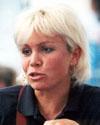
Recently on Cyclingnews.com |
An interview with Olga Slioussareva
Fly in the ointment
How does one make the transition from breaking world records as a sprinter on the track to breaking your competitors' legs in 200 kilometre-long stages in the La Grande Boucle? Sergey Kurdukov, Russian Eurosport commentator, meets the phenomenon that is Olga Slioussareva.
The Track World's in Copenhagen was, perhaps, not the most successful for the Russian squad. Depending on the criteria used, in unofficial team standings (based either on total medal score or on golds only) Russia finished in the region of 5th place. Russian cycling has seen better times - as well as worse ones - so the result looked good enough.
Fly in the ointment
But there is just one fly in this pot of ointment. A single person took home all the country's medals. Everybody knows this person, even those outright skeptics who believe women's cycling has only bleak days ahead.
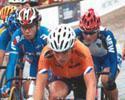 |
You'll hardly find another rider - male or female - who boasts such a kaleidoscopic collection of palmares as Olga Slioussareva. If you go by the book, a rider is supposed to be a sprinter or a rouleur, but never both. Yet when a cyclist sets a fantastic 200m flying start record which holds rock solid for 10 years, then a couple of seasons later, climbs famous Tour de France passes, refusing to drop out, only to win a pack finish the very next day, something is wrong. It's simply illogical!
I tried to find some sort of logic behind Olga's achievements.
Ruthlessly critical... of herself
She is a perfectionist - it is often the case with a Russian (or rather, ex-Soviet) sportswoman. When she took silver in the Pursuit at 2001 World's, everybody congratulated her, for it was no disgrace to be second to Leontien Zijlaard in her speciality. But Olga was bitterly disappointed and ruthlessly critical of herself.
The dream refused to come true once again; for many years she had been "just" an eternal podium-placer. The Points Race became a matter of life and death for her: it was yet another face-to-face with Van Moorsel. And this time Olga didn't leave anything to chance.
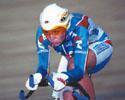 |
Has she become a lot more self-confident since that magical moment, crying tears of happiness on the top spot of the podium in Antwerp? I am afraid she hasn't. She has never been an exterminator of her rivals. She is brilliantly technical, tactically astute, enormously disciplined - all which bears much fruit but, strange as it is, she always holds her capabilities in doubt.
Leontien and Olga: hard women
This is yet another side where she and Leontien are similar. They are enormously strong, but still know what pre-start nerves are. Their spurts are like lightning, but when they fall they are not so quick to leave behind what happened. They are women, and make a point of remaining women in this hardest of sports, with feminine reactions and emotions.
But what brings the arch rivals together is that for both, sport is a part of family life. Or vice versa, whichever you prefer. Their coaches are their husbands, they keep them up, mobilise, create training plans - everything. The role of this 'tandem' approach is hard to value.
Family is cycling, cycling is family
Olga and her coaching husband Mikhail Rostovtsev have already been together for some 15 years. Originally from Kharkov, Ukraine, Slioussareva moved to Toula, south of Moscow, to try her legs in a newly formed Soviet team trained by Rostovtsev. Not so long before Mikhail had been a classy rider himself, but health troubles brought a premature end to his career. However, as the saying goes, every cloud has a silver lining.
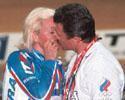 |
Rostovtsev made an ideal coach and husband for this gifted woman. Nothing has come quick and easy, so everything has a special value. Their first and only (for the time being, at least) son was born in 1997. And a silver lining turned into a golden one after more than 10 years in the elite ranks.
So what about the 2004 Games? Olga's Olympic debut came a bit late in 2000, but now she is heading towards remelting her Sydney bronze into Athens gold. And she won't be content with anything less.
No miracle
CN: Olga, most fans and specialists, looking through your long list of your palmares, can't help being amazed how it's possible to succeed in such different events as, say, the match sprint and road ITT? How was it possible to make a switch over the years?
OS: Well, there's no miracle there, at least for those who know me in my junior years when I started off as a roadie.
That period didn't last long, because in Kharkov, Ukraine, track traditions were stronger. In the USSR championships, I rode everything, from the pursuit to 200m flying start. In a couple of years, when an experimental national team was organized, based in Toula, I was told to narrow my ambitions to the sprint, but I still rode pursuit in winter time for stamina.
CN: And the coach of that team became your husband...
OS: That's right. Michail Rostovtsev was one of the youngest coaches, he had also possessed all what it takes to make a brilliant career as a rider, he had made the national team for the road TTT [together with a well known road racer and subsequent coach, Jouri Kachirine]. But suddenly his luck let him down just as the World's were around the corner. He caught a severe form of hepatitis and was forced to set his sights on a new career, which began as a coach in 1986. And he was almost an immediate success!
Science not a favourite subject
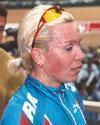 |
CN: So is he is the man who can give a scientific explanation of how a track sprinter dreaming about winning on the road should act?
OS: I'm afraid that when talking about science, I'll disappoint you in saying that I never go through standard power output and threshold tests, believe it or not. We make use of heart rate monitors, but that's the end of the topic of science. My last 'fundamental' test took place in... let me think... a Ukrainian republican team, in the late 80's.
CN: And what were the results?
OS: I wish I knew. Doctors didn't tell us young riders a thing, but we didn't care - our business was to train and race.
Today, after such a lengthy career, I feel my body better than any electronic device does. And Micha understands me without a word. It's enough for him to look in my eyes in the morning to be sure what I'm capable of and what I should aspire to.
CN: Let's talk about that incredible switch from thinking about seconds on the track to hours on the road.
OS: Again it doesn't look incredible for insiders. For a bystander, yes, it does look like a miracle has happened in a blink. But actually, it was a lengthy process, and not as easy at that. Michail and I made up our minds to try me out on the road when I gave birth to my son.
Financially challenged
CN: So you searched for a new challenge?
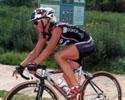 |
OS: Yes, but that's just a part of the story. Forgive me for saying so, but we looked for money as well. You cannot make a decent salary on the track. Earlier this season I made a couple of hundred euros through my performance in the Track World Cup. But there are only a few World Cups and other highly rated track races and you can't win them all. We will never earn as much as men do on the road, but at least there are a lot of races.
Road races are breathtaking; there's no doubt about it. Here in Krylatskote at the Russian championships I felt like flying a helicopter: up-down, left-right, gear up-gear down. Strange but true, I had never raced on the Olympic road circuit in Moscow, although I did ride a nearby - a hundred meters away in Krylatskoye velodrome. So my debut two medals weren't a bad result, were they?
The Slioussareva metamorphosis
CN: Some sporting specialists say that every so often, after a delivery of a child, dramatic changes occur in a woman's body that pave the way for a physical breakthrough. Did you feel something like that?
OS: Quite frankly, no. Of course, some metamorphosis did happen, but not the course of a day. Giving birth had nothing to do with that; I had to shed weight not to die in the mountains, and I did it. When I took the silver medal in a sprint at the World Championships in Bogota, I weighed 68 kilos. Now I'm almost 10 kilos lighter.
CN: Still, do you have to worry about making the time limit in the women's Tour de France, like some of the top male sprinters do in their version of the Tour?
OS: That's true. Certainly, climbs longer than 10 km are not my territory, but I suffer - I don't die. As to somewhat shorter climbs, sometimes I pleasantly surprise myself by making it to the top with specialist climbers.
Life as nomads
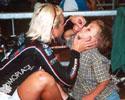 |
CN: Getting back to family matters. It can hardly pass unnoticed by anyone that your husband and son's presence keeps you going. Your son, Seriozha, is always on the podium beside you. But is this a nomad's way of life - how do you get by?
OS: We got used to it. Seriozha has been growing up inside the track oval since he was two months old. He feels at home there. He's been places and he's seen things perhaps no one else has seen at his age. In the off-season, when we stop wandering, we rent some dwelling in Italy, and he attends soccer school and swimming training.
CN: But what about cycling? I saw him riding a BMX - he looked so fearless.
OS: Natually, he has the taste for it, but it's too early to talk about it seriously. We'll see. At least for now, soccer comes first.
While she may be a multiple World Champion, Slioussareva is also like any other woman, trying to solve day-to-day problems. However, unlike most women, she has the unique problem of trying to win gold at the Olympics in Athens.
For a woman like Olga Slioussareva, anything's possible.

